1st Sem ACT505: Accounting Theory and Contemporary Issues Report
VerifiedAdded on 2023/01/16
|13
|2923
|76
Report
AI Summary
This report provides a comprehensive analysis of accounting theory and contemporary issues, focusing on a case study of a tea plantation company in Sri Lanka. It explores the environmental and social issues within the tea industry, including the use of fertilizers and pesticides, and the socio-political and economic context affecting the company. The report delves into the ethical and managerial branches of stakeholder theory, examining how the company addresses stakeholder interests and manages sustainability development. It also discusses the six capital model of the IIRC and the isomorphic processes of institutional theories. The analysis covers the company's strategies to address environmental and social concerns, the importance of fair trade practices, and the role of government support. The report highlights the significance of stakeholder engagement, sustainability development, and the application of the six capital framework to improve business viability and community relations. The study also addresses the challenges faced by the tea industry, such as climate conditions and storage issues, and how the company can improve the quality of life of the workers.
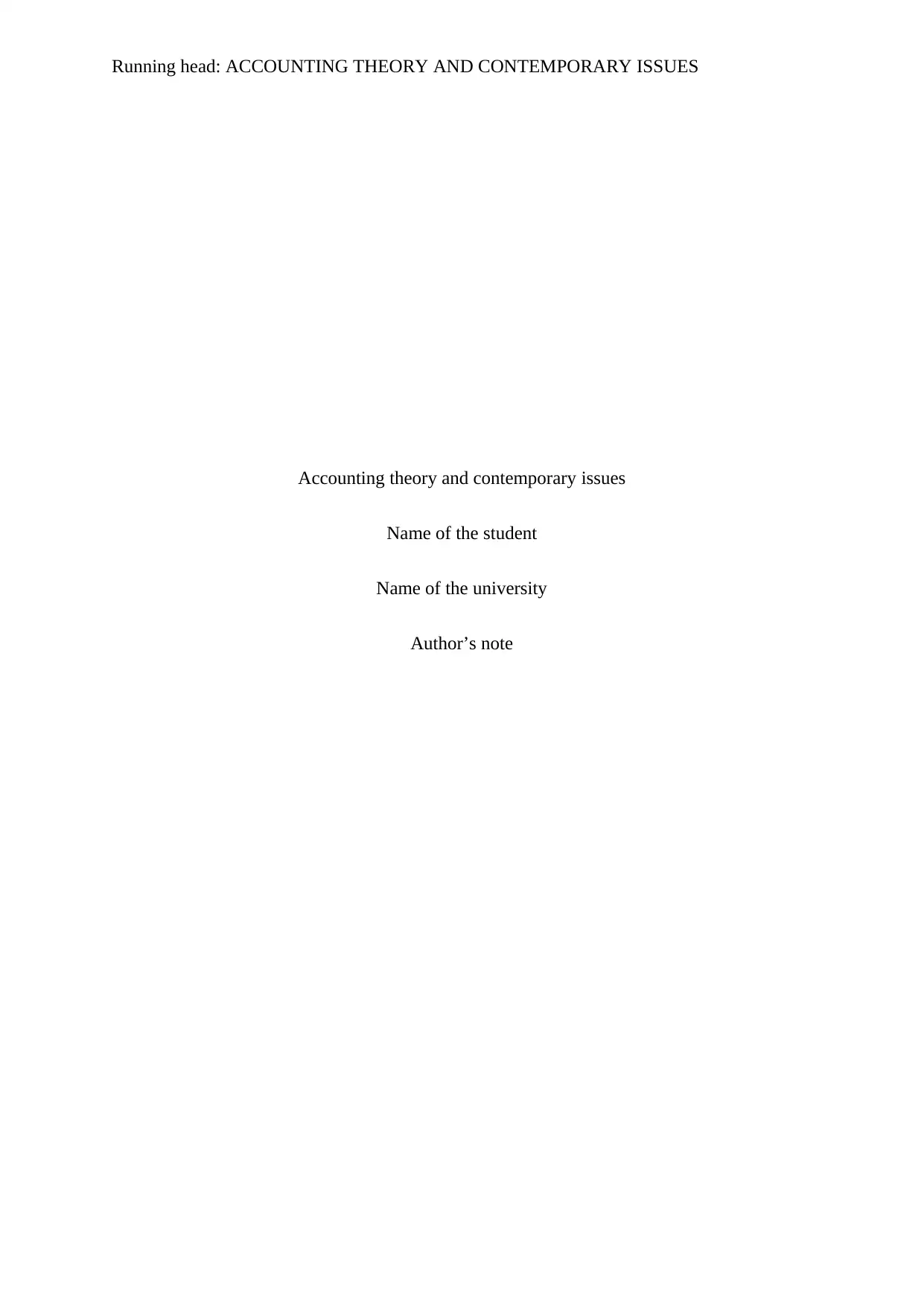
Running head: ACCOUNTING THEORY AND CONTEMPORARY ISSUES
Accounting theory and contemporary issues
Name of the student
Name of the university
Author’s note
Accounting theory and contemporary issues
Name of the student
Name of the university
Author’s note
Paraphrase This Document
Need a fresh take? Get an instant paraphrase of this document with our AI Paraphraser
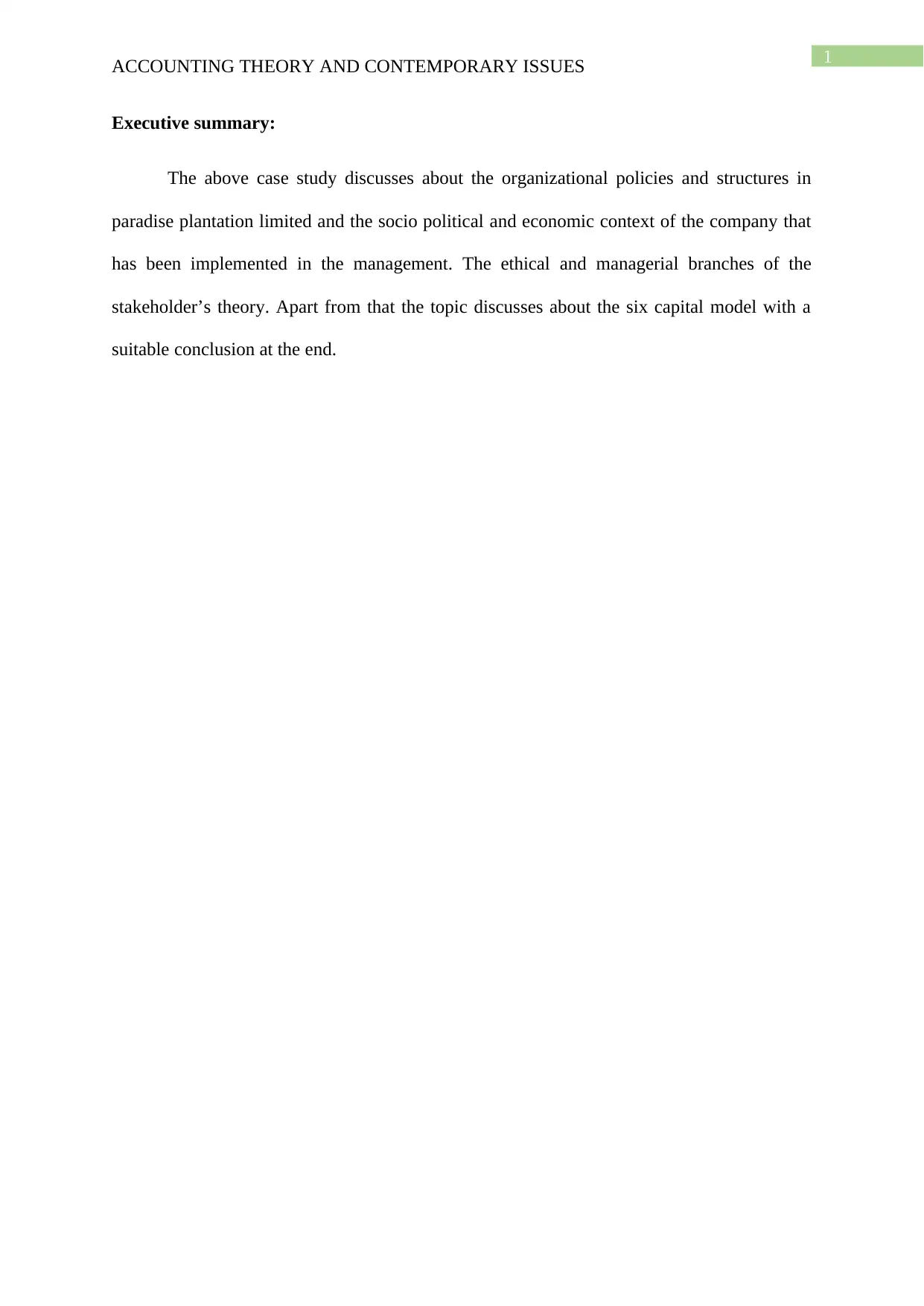
1
ACCOUNTING THEORY AND CONTEMPORARY ISSUES
Executive summary:
The above case study discusses about the organizational policies and structures in
paradise plantation limited and the socio political and economic context of the company that
has been implemented in the management. The ethical and managerial branches of the
stakeholder’s theory. Apart from that the topic discusses about the six capital model with a
suitable conclusion at the end.
ACCOUNTING THEORY AND CONTEMPORARY ISSUES
Executive summary:
The above case study discusses about the organizational policies and structures in
paradise plantation limited and the socio political and economic context of the company that
has been implemented in the management. The ethical and managerial branches of the
stakeholder’s theory. Apart from that the topic discusses about the six capital model with a
suitable conclusion at the end.
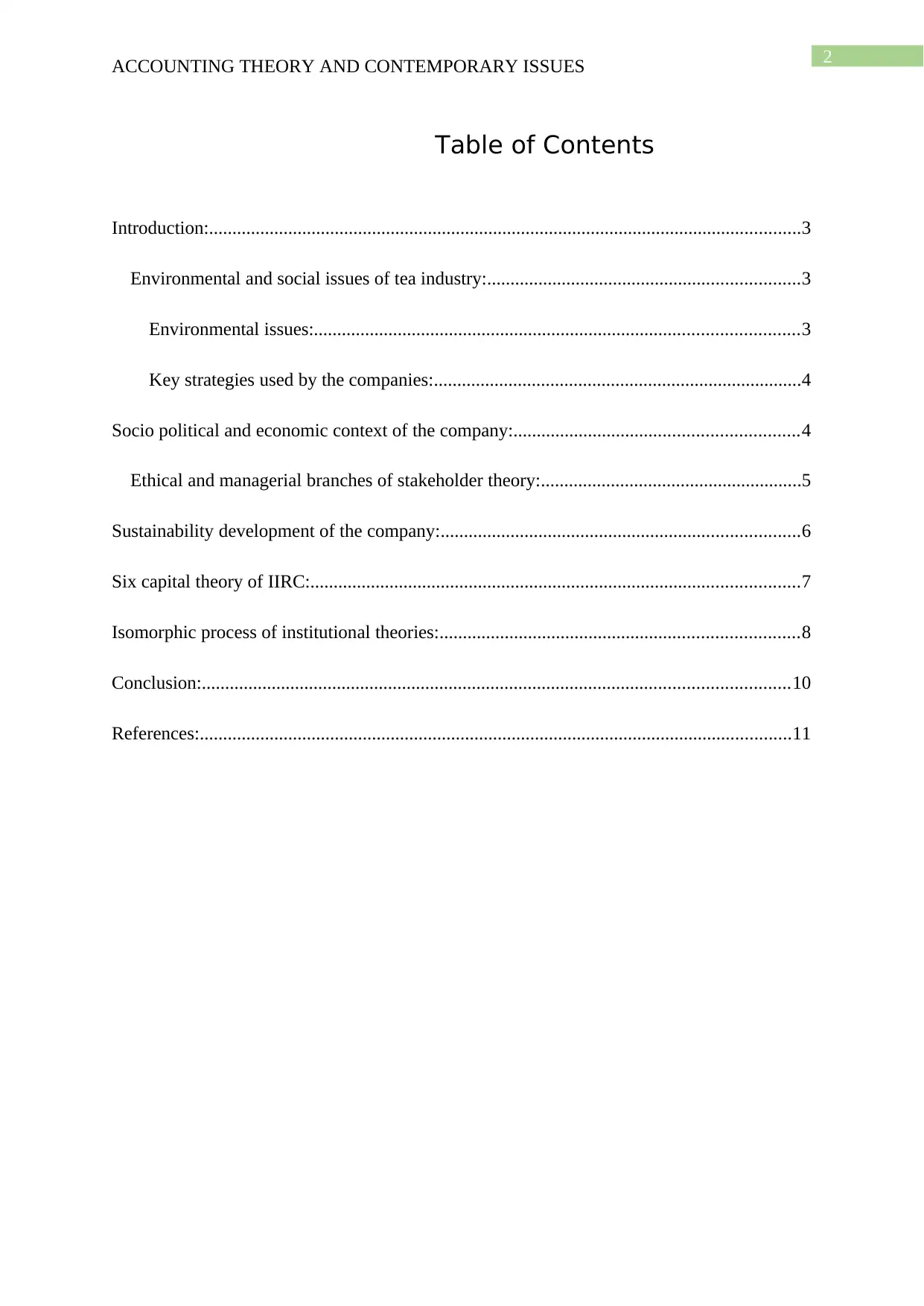
2
ACCOUNTING THEORY AND CONTEMPORARY ISSUES
Table of Contents
Introduction:...............................................................................................................................3
Environmental and social issues of tea industry:...................................................................3
Environmental issues:........................................................................................................3
Key strategies used by the companies:...............................................................................4
Socio political and economic context of the company:.............................................................4
Ethical and managerial branches of stakeholder theory:........................................................5
Sustainability development of the company:.............................................................................6
Six capital theory of IIRC:.........................................................................................................7
Isomorphic process of institutional theories:.............................................................................8
Conclusion:..............................................................................................................................10
References:...............................................................................................................................11
ACCOUNTING THEORY AND CONTEMPORARY ISSUES
Table of Contents
Introduction:...............................................................................................................................3
Environmental and social issues of tea industry:...................................................................3
Environmental issues:........................................................................................................3
Key strategies used by the companies:...............................................................................4
Socio political and economic context of the company:.............................................................4
Ethical and managerial branches of stakeholder theory:........................................................5
Sustainability development of the company:.............................................................................6
Six capital theory of IIRC:.........................................................................................................7
Isomorphic process of institutional theories:.............................................................................8
Conclusion:..............................................................................................................................10
References:...............................................................................................................................11
⊘ This is a preview!⊘
Do you want full access?
Subscribe today to unlock all pages.

Trusted by 1+ million students worldwide
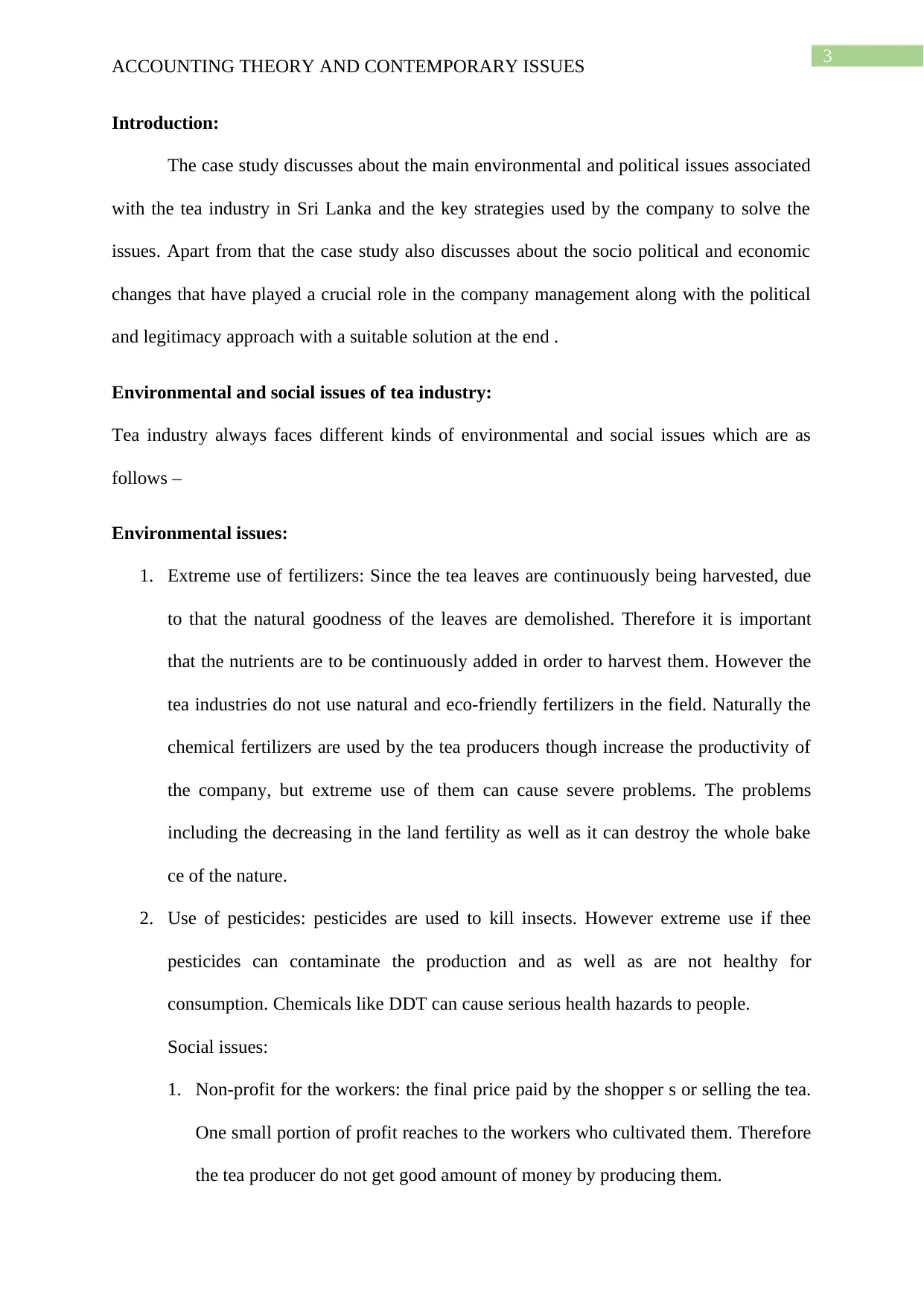
3
ACCOUNTING THEORY AND CONTEMPORARY ISSUES
Introduction:
The case study discusses about the main environmental and political issues associated
with the tea industry in Sri Lanka and the key strategies used by the company to solve the
issues. Apart from that the case study also discusses about the socio political and economic
changes that have played a crucial role in the company management along with the political
and legitimacy approach with a suitable solution at the end .
Environmental and social issues of tea industry:
Tea industry always faces different kinds of environmental and social issues which are as
follows –
Environmental issues:
1. Extreme use of fertilizers: Since the tea leaves are continuously being harvested, due
to that the natural goodness of the leaves are demolished. Therefore it is important
that the nutrients are to be continuously added in order to harvest them. However the
tea industries do not use natural and eco-friendly fertilizers in the field. Naturally the
chemical fertilizers are used by the tea producers though increase the productivity of
the company, but extreme use of them can cause severe problems. The problems
including the decreasing in the land fertility as well as it can destroy the whole bake
ce of the nature.
2. Use of pesticides: pesticides are used to kill insects. However extreme use if thee
pesticides can contaminate the production and as well as are not healthy for
consumption. Chemicals like DDT can cause serious health hazards to people.
Social issues:
1. Non-profit for the workers: the final price paid by the shopper s or selling the tea.
One small portion of profit reaches to the workers who cultivated them. Therefore
the tea producer do not get good amount of money by producing them.
ACCOUNTING THEORY AND CONTEMPORARY ISSUES
Introduction:
The case study discusses about the main environmental and political issues associated
with the tea industry in Sri Lanka and the key strategies used by the company to solve the
issues. Apart from that the case study also discusses about the socio political and economic
changes that have played a crucial role in the company management along with the political
and legitimacy approach with a suitable solution at the end .
Environmental and social issues of tea industry:
Tea industry always faces different kinds of environmental and social issues which are as
follows –
Environmental issues:
1. Extreme use of fertilizers: Since the tea leaves are continuously being harvested, due
to that the natural goodness of the leaves are demolished. Therefore it is important
that the nutrients are to be continuously added in order to harvest them. However the
tea industries do not use natural and eco-friendly fertilizers in the field. Naturally the
chemical fertilizers are used by the tea producers though increase the productivity of
the company, but extreme use of them can cause severe problems. The problems
including the decreasing in the land fertility as well as it can destroy the whole bake
ce of the nature.
2. Use of pesticides: pesticides are used to kill insects. However extreme use if thee
pesticides can contaminate the production and as well as are not healthy for
consumption. Chemicals like DDT can cause serious health hazards to people.
Social issues:
1. Non-profit for the workers: the final price paid by the shopper s or selling the tea.
One small portion of profit reaches to the workers who cultivated them. Therefore
the tea producer do not get good amount of money by producing them.
Paraphrase This Document
Need a fresh take? Get an instant paraphrase of this document with our AI Paraphraser
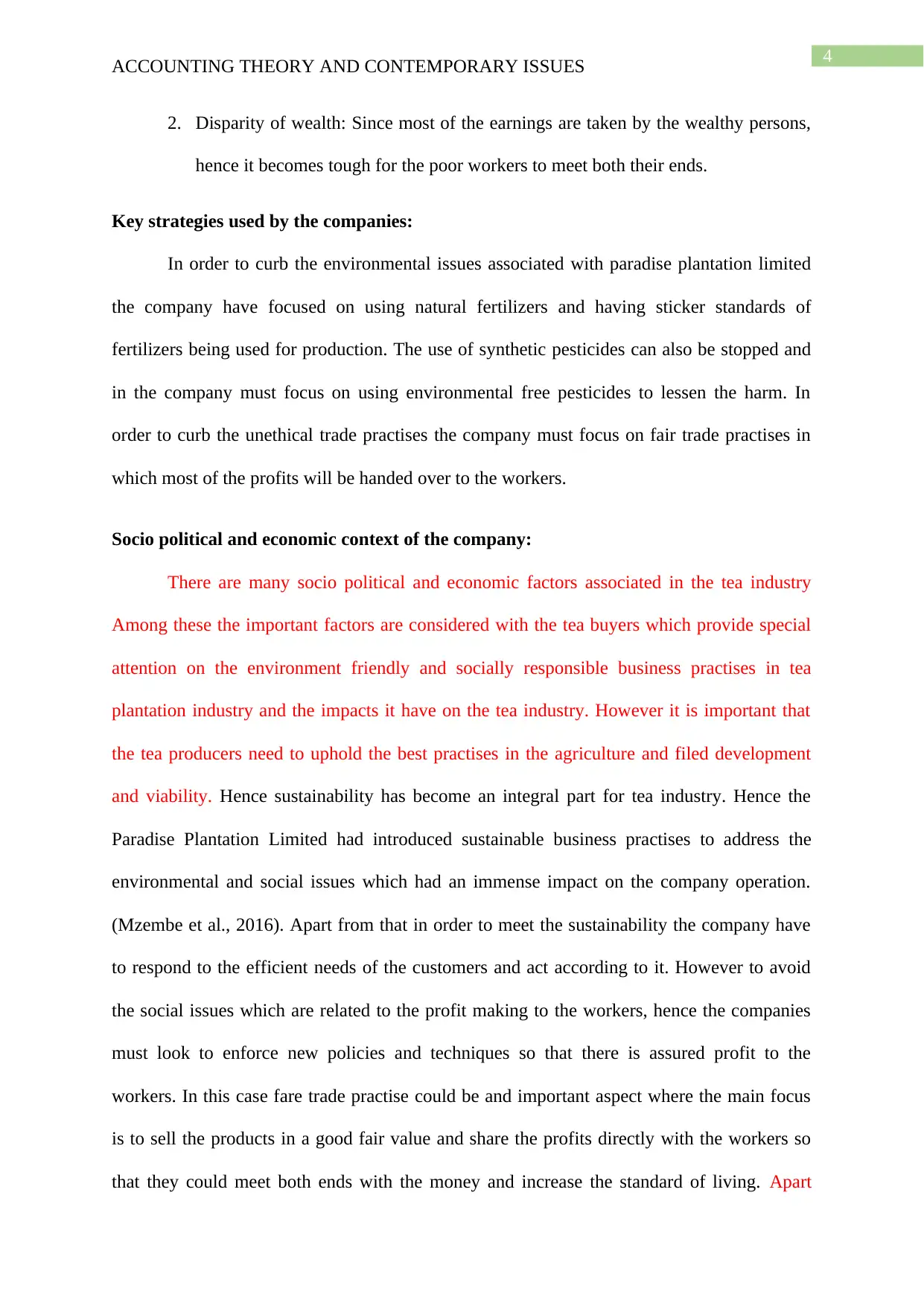
4
ACCOUNTING THEORY AND CONTEMPORARY ISSUES
2. Disparity of wealth: Since most of the earnings are taken by the wealthy persons,
hence it becomes tough for the poor workers to meet both their ends.
Key strategies used by the companies:
In order to curb the environmental issues associated with paradise plantation limited
the company have focused on using natural fertilizers and having sticker standards of
fertilizers being used for production. The use of synthetic pesticides can also be stopped and
in the company must focus on using environmental free pesticides to lessen the harm. In
order to curb the unethical trade practises the company must focus on fair trade practises in
which most of the profits will be handed over to the workers.
Socio political and economic context of the company:
There are many socio political and economic factors associated in the tea industry
Among these the important factors are considered with the tea buyers which provide special
attention on the environment friendly and socially responsible business practises in tea
plantation industry and the impacts it have on the tea industry. However it is important that
the tea producers need to uphold the best practises in the agriculture and filed development
and viability. Hence sustainability has become an integral part for tea industry. Hence the
Paradise Plantation Limited had introduced sustainable business practises to address the
environmental and social issues which had an immense impact on the company operation.
(Mzembe et al., 2016). Apart from that in order to meet the sustainability the company have
to respond to the efficient needs of the customers and act according to it. However to avoid
the social issues which are related to the profit making to the workers, hence the companies
must look to enforce new policies and techniques so that there is assured profit to the
workers. In this case fare trade practise could be and important aspect where the main focus
is to sell the products in a good fair value and share the profits directly with the workers so
that they could meet both ends with the money and increase the standard of living. Apart
ACCOUNTING THEORY AND CONTEMPORARY ISSUES
2. Disparity of wealth: Since most of the earnings are taken by the wealthy persons,
hence it becomes tough for the poor workers to meet both their ends.
Key strategies used by the companies:
In order to curb the environmental issues associated with paradise plantation limited
the company have focused on using natural fertilizers and having sticker standards of
fertilizers being used for production. The use of synthetic pesticides can also be stopped and
in the company must focus on using environmental free pesticides to lessen the harm. In
order to curb the unethical trade practises the company must focus on fair trade practises in
which most of the profits will be handed over to the workers.
Socio political and economic context of the company:
There are many socio political and economic factors associated in the tea industry
Among these the important factors are considered with the tea buyers which provide special
attention on the environment friendly and socially responsible business practises in tea
plantation industry and the impacts it have on the tea industry. However it is important that
the tea producers need to uphold the best practises in the agriculture and filed development
and viability. Hence sustainability has become an integral part for tea industry. Hence the
Paradise Plantation Limited had introduced sustainable business practises to address the
environmental and social issues which had an immense impact on the company operation.
(Mzembe et al., 2016). Apart from that in order to meet the sustainability the company have
to respond to the efficient needs of the customers and act according to it. However to avoid
the social issues which are related to the profit making to the workers, hence the companies
must look to enforce new policies and techniques so that there is assured profit to the
workers. In this case fare trade practise could be and important aspect where the main focus
is to sell the products in a good fair value and share the profits directly with the workers so
that they could meet both ends with the money and increase the standard of living. Apart
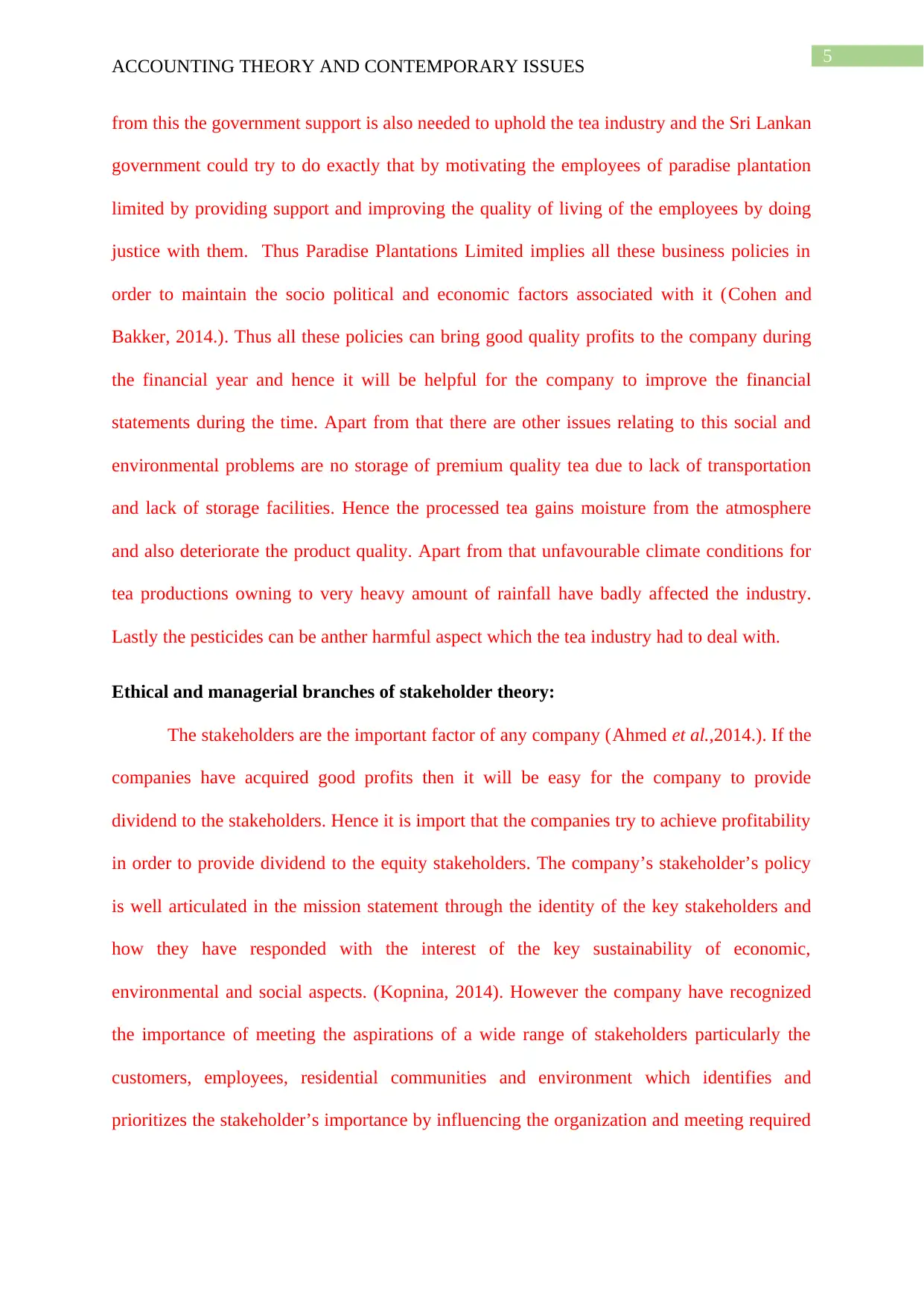
5
ACCOUNTING THEORY AND CONTEMPORARY ISSUES
from this the government support is also needed to uphold the tea industry and the Sri Lankan
government could try to do exactly that by motivating the employees of paradise plantation
limited by providing support and improving the quality of living of the employees by doing
justice with them. Thus Paradise Plantations Limited implies all these business policies in
order to maintain the socio political and economic factors associated with it (Cohen and
Bakker, 2014.). Thus all these policies can bring good quality profits to the company during
the financial year and hence it will be helpful for the company to improve the financial
statements during the time. Apart from that there are other issues relating to this social and
environmental problems are no storage of premium quality tea due to lack of transportation
and lack of storage facilities. Hence the processed tea gains moisture from the atmosphere
and also deteriorate the product quality. Apart from that unfavourable climate conditions for
tea productions owning to very heavy amount of rainfall have badly affected the industry.
Lastly the pesticides can be anther harmful aspect which the tea industry had to deal with.
Ethical and managerial branches of stakeholder theory:
The stakeholders are the important factor of any company (Ahmed et al.,2014.). If the
companies have acquired good profits then it will be easy for the company to provide
dividend to the stakeholders. Hence it is import that the companies try to achieve profitability
in order to provide dividend to the equity stakeholders. The company’s stakeholder’s policy
is well articulated in the mission statement through the identity of the key stakeholders and
how they have responded with the interest of the key sustainability of economic,
environmental and social aspects. (Kopnina, 2014). However the company have recognized
the importance of meeting the aspirations of a wide range of stakeholders particularly the
customers, employees, residential communities and environment which identifies and
prioritizes the stakeholder’s importance by influencing the organization and meeting required
ACCOUNTING THEORY AND CONTEMPORARY ISSUES
from this the government support is also needed to uphold the tea industry and the Sri Lankan
government could try to do exactly that by motivating the employees of paradise plantation
limited by providing support and improving the quality of living of the employees by doing
justice with them. Thus Paradise Plantations Limited implies all these business policies in
order to maintain the socio political and economic factors associated with it (Cohen and
Bakker, 2014.). Thus all these policies can bring good quality profits to the company during
the financial year and hence it will be helpful for the company to improve the financial
statements during the time. Apart from that there are other issues relating to this social and
environmental problems are no storage of premium quality tea due to lack of transportation
and lack of storage facilities. Hence the processed tea gains moisture from the atmosphere
and also deteriorate the product quality. Apart from that unfavourable climate conditions for
tea productions owning to very heavy amount of rainfall have badly affected the industry.
Lastly the pesticides can be anther harmful aspect which the tea industry had to deal with.
Ethical and managerial branches of stakeholder theory:
The stakeholders are the important factor of any company (Ahmed et al.,2014.). If the
companies have acquired good profits then it will be easy for the company to provide
dividend to the stakeholders. Hence it is import that the companies try to achieve profitability
in order to provide dividend to the equity stakeholders. The company’s stakeholder’s policy
is well articulated in the mission statement through the identity of the key stakeholders and
how they have responded with the interest of the key sustainability of economic,
environmental and social aspects. (Kopnina, 2014). However the company have recognized
the importance of meeting the aspirations of a wide range of stakeholders particularly the
customers, employees, residential communities and environment which identifies and
prioritizes the stakeholder’s importance by influencing the organization and meeting required
⊘ This is a preview!⊘
Do you want full access?
Subscribe today to unlock all pages.

Trusted by 1+ million students worldwide
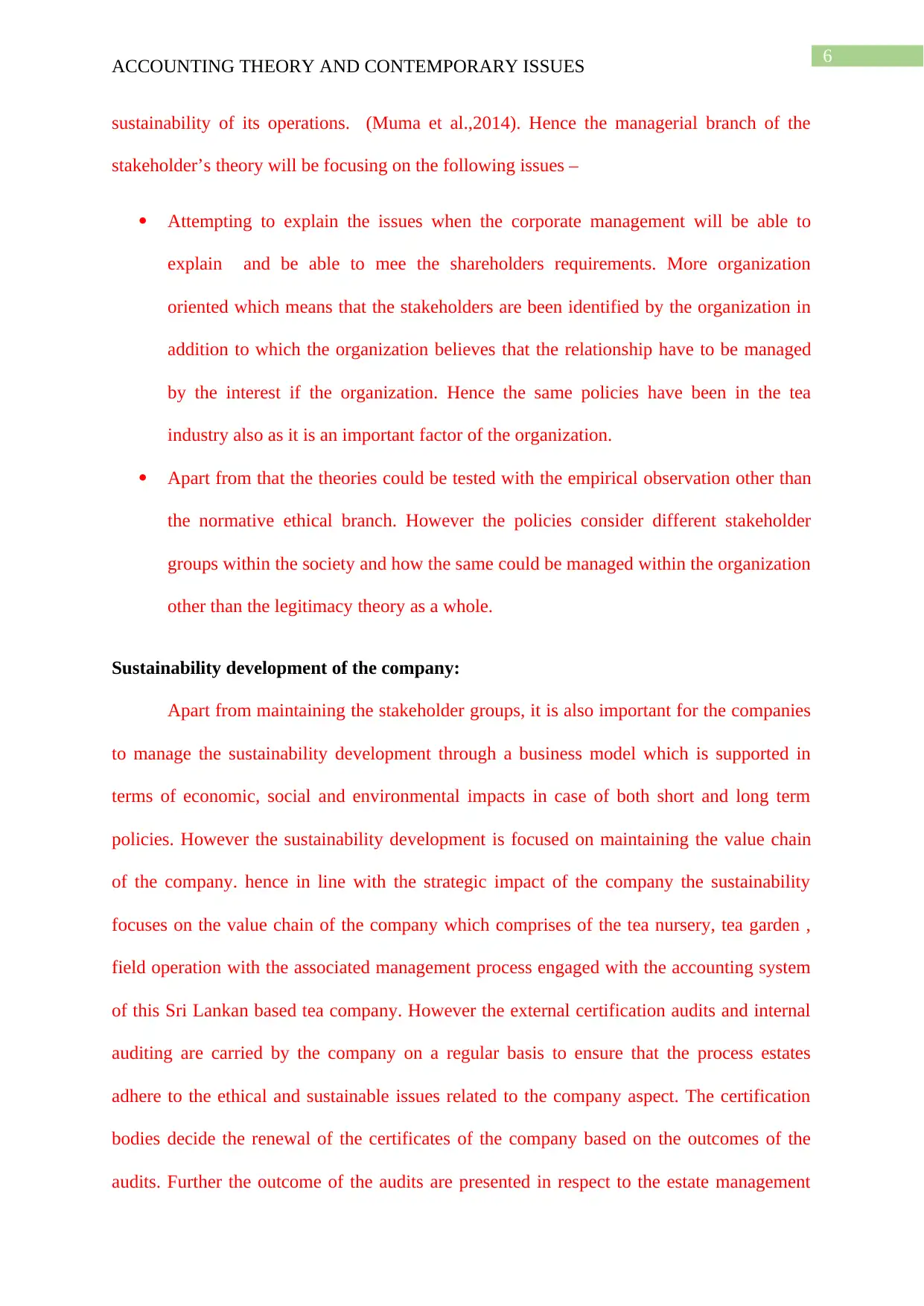
6
ACCOUNTING THEORY AND CONTEMPORARY ISSUES
sustainability of its operations. (Muma et al.,2014). Hence the managerial branch of the
stakeholder’s theory will be focusing on the following issues –
Attempting to explain the issues when the corporate management will be able to
explain and be able to mee the shareholders requirements. More organization
oriented which means that the stakeholders are been identified by the organization in
addition to which the organization believes that the relationship have to be managed
by the interest if the organization. Hence the same policies have been in the tea
industry also as it is an important factor of the organization.
Apart from that the theories could be tested with the empirical observation other than
the normative ethical branch. However the policies consider different stakeholder
groups within the society and how the same could be managed within the organization
other than the legitimacy theory as a whole.
Sustainability development of the company:
Apart from maintaining the stakeholder groups, it is also important for the companies
to manage the sustainability development through a business model which is supported in
terms of economic, social and environmental impacts in case of both short and long term
policies. However the sustainability development is focused on maintaining the value chain
of the company. hence in line with the strategic impact of the company the sustainability
focuses on the value chain of the company which comprises of the tea nursery, tea garden ,
field operation with the associated management process engaged with the accounting system
of this Sri Lankan based tea company. However the external certification audits and internal
auditing are carried by the company on a regular basis to ensure that the process estates
adhere to the ethical and sustainable issues related to the company aspect. The certification
bodies decide the renewal of the certificates of the company based on the outcomes of the
audits. Further the outcome of the audits are presented in respect to the estate management
ACCOUNTING THEORY AND CONTEMPORARY ISSUES
sustainability of its operations. (Muma et al.,2014). Hence the managerial branch of the
stakeholder’s theory will be focusing on the following issues –
Attempting to explain the issues when the corporate management will be able to
explain and be able to mee the shareholders requirements. More organization
oriented which means that the stakeholders are been identified by the organization in
addition to which the organization believes that the relationship have to be managed
by the interest if the organization. Hence the same policies have been in the tea
industry also as it is an important factor of the organization.
Apart from that the theories could be tested with the empirical observation other than
the normative ethical branch. However the policies consider different stakeholder
groups within the society and how the same could be managed within the organization
other than the legitimacy theory as a whole.
Sustainability development of the company:
Apart from maintaining the stakeholder groups, it is also important for the companies
to manage the sustainability development through a business model which is supported in
terms of economic, social and environmental impacts in case of both short and long term
policies. However the sustainability development is focused on maintaining the value chain
of the company. hence in line with the strategic impact of the company the sustainability
focuses on the value chain of the company which comprises of the tea nursery, tea garden ,
field operation with the associated management process engaged with the accounting system
of this Sri Lankan based tea company. However the external certification audits and internal
auditing are carried by the company on a regular basis to ensure that the process estates
adhere to the ethical and sustainable issues related to the company aspect. The certification
bodies decide the renewal of the certificates of the company based on the outcomes of the
audits. Further the outcome of the audits are presented in respect to the estate management
Paraphrase This Document
Need a fresh take? Get an instant paraphrase of this document with our AI Paraphraser
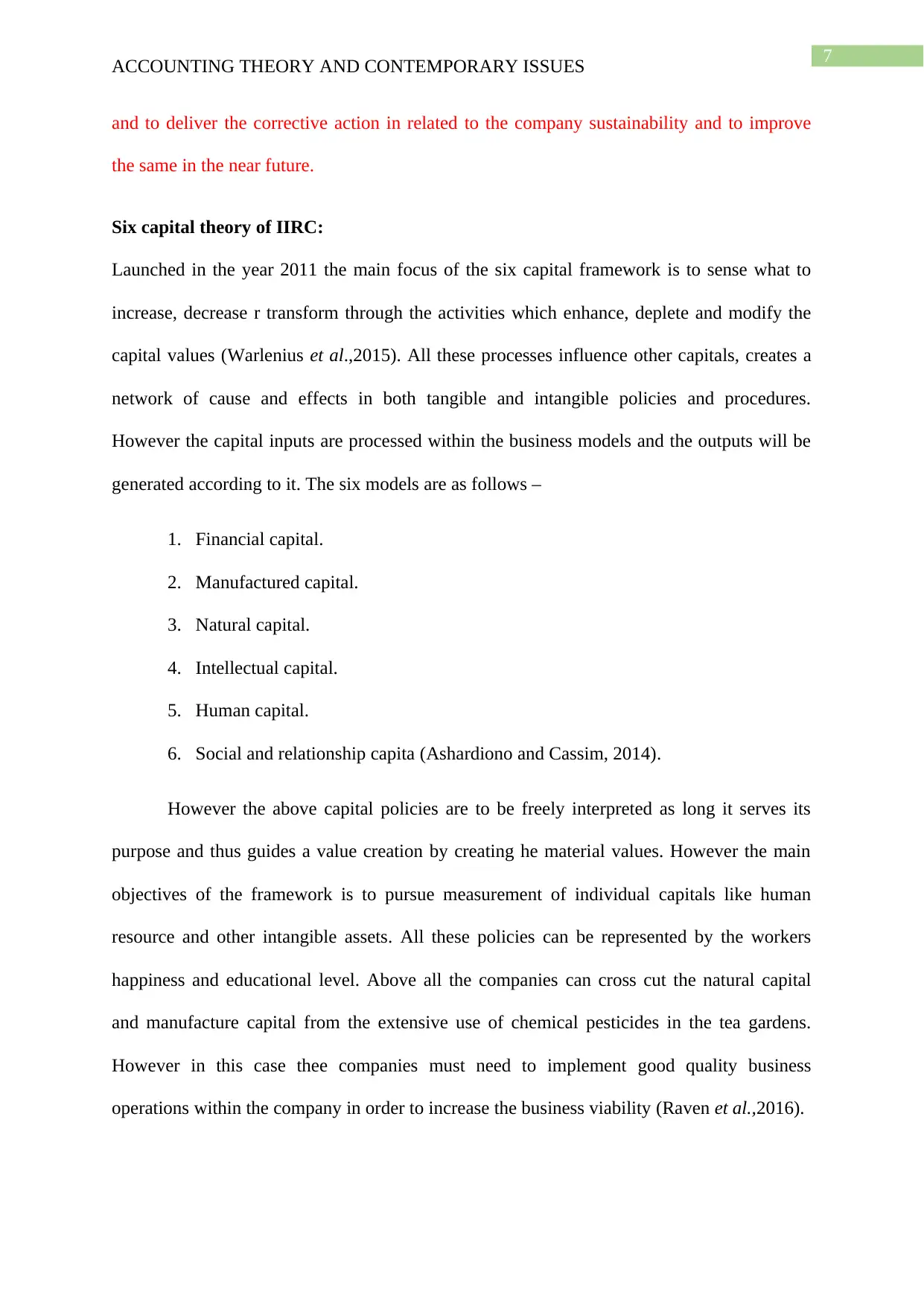
7
ACCOUNTING THEORY AND CONTEMPORARY ISSUES
and to deliver the corrective action in related to the company sustainability and to improve
the same in the near future.
Six capital theory of IIRC:
Launched in the year 2011 the main focus of the six capital framework is to sense what to
increase, decrease r transform through the activities which enhance, deplete and modify the
capital values (Warlenius et al.,2015). All these processes influence other capitals, creates a
network of cause and effects in both tangible and intangible policies and procedures.
However the capital inputs are processed within the business models and the outputs will be
generated according to it. The six models are as follows –
1. Financial capital.
2. Manufactured capital.
3. Natural capital.
4. Intellectual capital.
5. Human capital.
6. Social and relationship capita (Ashardiono and Cassim, 2014).
However the above capital policies are to be freely interpreted as long it serves its
purpose and thus guides a value creation by creating he material values. However the main
objectives of the framework is to pursue measurement of individual capitals like human
resource and other intangible assets. All these policies can be represented by the workers
happiness and educational level. Above all the companies can cross cut the natural capital
and manufacture capital from the extensive use of chemical pesticides in the tea gardens.
However in this case thee companies must need to implement good quality business
operations within the company in order to increase the business viability (Raven et al.,2016).
ACCOUNTING THEORY AND CONTEMPORARY ISSUES
and to deliver the corrective action in related to the company sustainability and to improve
the same in the near future.
Six capital theory of IIRC:
Launched in the year 2011 the main focus of the six capital framework is to sense what to
increase, decrease r transform through the activities which enhance, deplete and modify the
capital values (Warlenius et al.,2015). All these processes influence other capitals, creates a
network of cause and effects in both tangible and intangible policies and procedures.
However the capital inputs are processed within the business models and the outputs will be
generated according to it. The six models are as follows –
1. Financial capital.
2. Manufactured capital.
3. Natural capital.
4. Intellectual capital.
5. Human capital.
6. Social and relationship capita (Ashardiono and Cassim, 2014).
However the above capital policies are to be freely interpreted as long it serves its
purpose and thus guides a value creation by creating he material values. However the main
objectives of the framework is to pursue measurement of individual capitals like human
resource and other intangible assets. All these policies can be represented by the workers
happiness and educational level. Above all the companies can cross cut the natural capital
and manufacture capital from the extensive use of chemical pesticides in the tea gardens.
However in this case thee companies must need to implement good quality business
operations within the company in order to increase the business viability (Raven et al.,2016).
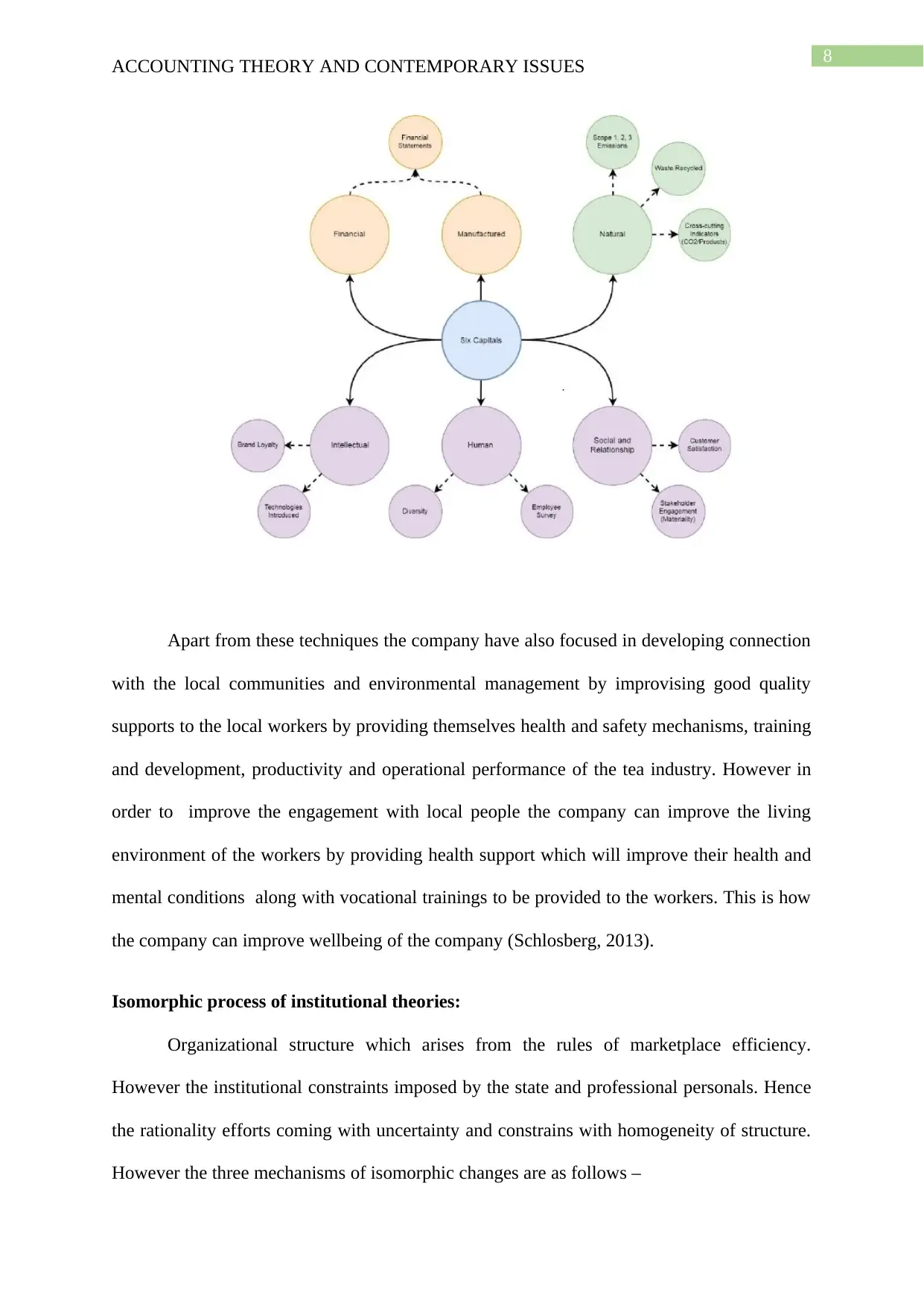
8
ACCOUNTING THEORY AND CONTEMPORARY ISSUES
Apart from these techniques the company have also focused in developing connection
with the local communities and environmental management by improvising good quality
supports to the local workers by providing themselves health and safety mechanisms, training
and development, productivity and operational performance of the tea industry. However in
order to improve the engagement with local people the company can improve the living
environment of the workers by providing health support which will improve their health and
mental conditions along with vocational trainings to be provided to the workers. This is how
the company can improve wellbeing of the company (Schlosberg, 2013).
Isomorphic process of institutional theories:
Organizational structure which arises from the rules of marketplace efficiency.
However the institutional constraints imposed by the state and professional personals. Hence
the rationality efforts coming with uncertainty and constrains with homogeneity of structure.
However the three mechanisms of isomorphic changes are as follows –
ACCOUNTING THEORY AND CONTEMPORARY ISSUES
Apart from these techniques the company have also focused in developing connection
with the local communities and environmental management by improvising good quality
supports to the local workers by providing themselves health and safety mechanisms, training
and development, productivity and operational performance of the tea industry. However in
order to improve the engagement with local people the company can improve the living
environment of the workers by providing health support which will improve their health and
mental conditions along with vocational trainings to be provided to the workers. This is how
the company can improve wellbeing of the company (Schlosberg, 2013).
Isomorphic process of institutional theories:
Organizational structure which arises from the rules of marketplace efficiency.
However the institutional constraints imposed by the state and professional personals. Hence
the rationality efforts coming with uncertainty and constrains with homogeneity of structure.
However the three mechanisms of isomorphic changes are as follows –
⊘ This is a preview!⊘
Do you want full access?
Subscribe today to unlock all pages.

Trusted by 1+ million students worldwide
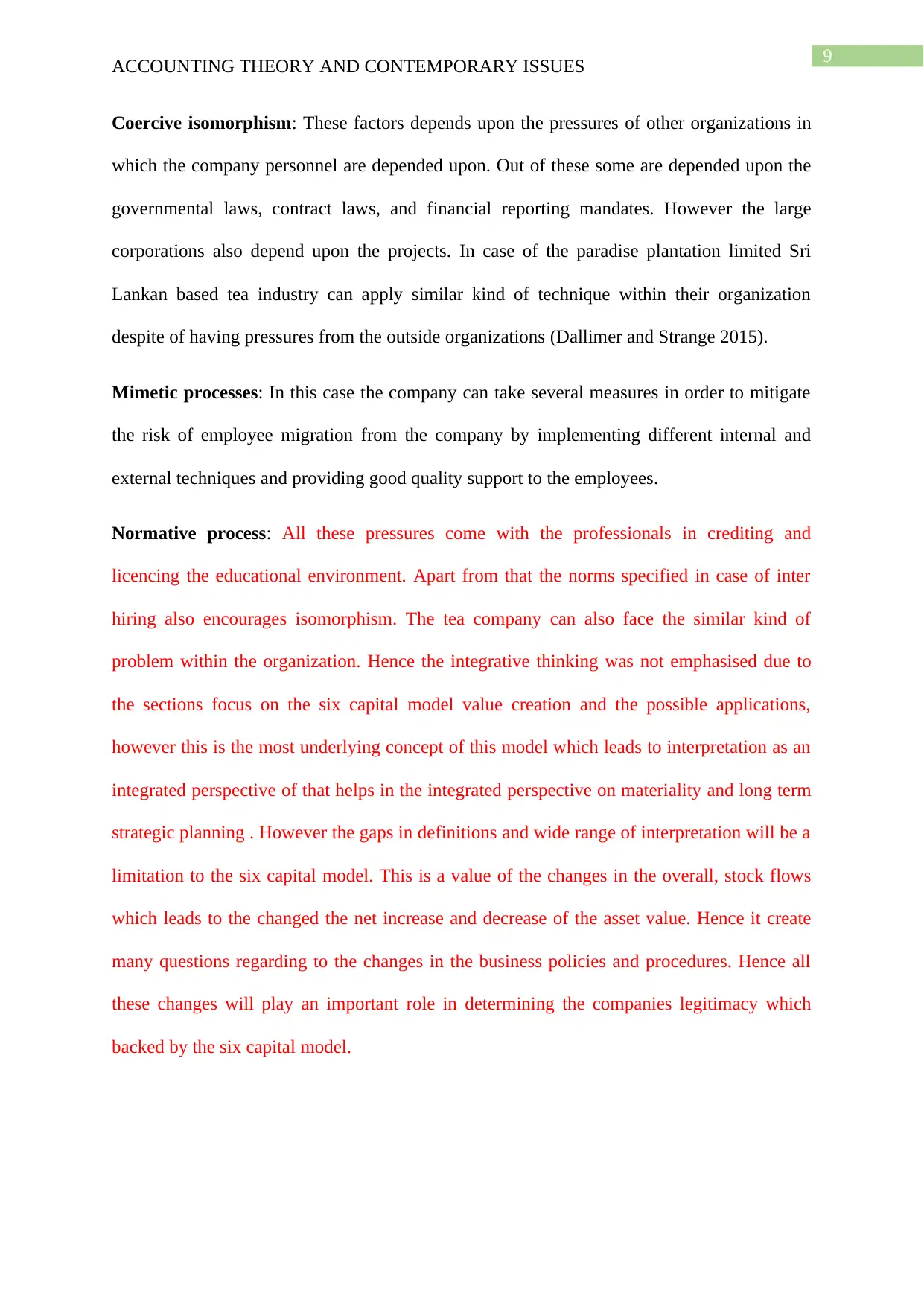
9
ACCOUNTING THEORY AND CONTEMPORARY ISSUES
Coercive isomorphism: These factors depends upon the pressures of other organizations in
which the company personnel are depended upon. Out of these some are depended upon the
governmental laws, contract laws, and financial reporting mandates. However the large
corporations also depend upon the projects. In case of the paradise plantation limited Sri
Lankan based tea industry can apply similar kind of technique within their organization
despite of having pressures from the outside organizations (Dallimer and Strange 2015).
Mimetic processes: In this case the company can take several measures in order to mitigate
the risk of employee migration from the company by implementing different internal and
external techniques and providing good quality support to the employees.
Normative process: All these pressures come with the professionals in crediting and
licencing the educational environment. Apart from that the norms specified in case of inter
hiring also encourages isomorphism. The tea company can also face the similar kind of
problem within the organization. Hence the integrative thinking was not emphasised due to
the sections focus on the six capital model value creation and the possible applications,
however this is the most underlying concept of this model which leads to interpretation as an
integrated perspective of that helps in the integrated perspective on materiality and long term
strategic planning . However the gaps in definitions and wide range of interpretation will be a
limitation to the six capital model. This is a value of the changes in the overall, stock flows
which leads to the changed the net increase and decrease of the asset value. Hence it create
many questions regarding to the changes in the business policies and procedures. Hence all
these changes will play an important role in determining the companies legitimacy which
backed by the six capital model.
ACCOUNTING THEORY AND CONTEMPORARY ISSUES
Coercive isomorphism: These factors depends upon the pressures of other organizations in
which the company personnel are depended upon. Out of these some are depended upon the
governmental laws, contract laws, and financial reporting mandates. However the large
corporations also depend upon the projects. In case of the paradise plantation limited Sri
Lankan based tea industry can apply similar kind of technique within their organization
despite of having pressures from the outside organizations (Dallimer and Strange 2015).
Mimetic processes: In this case the company can take several measures in order to mitigate
the risk of employee migration from the company by implementing different internal and
external techniques and providing good quality support to the employees.
Normative process: All these pressures come with the professionals in crediting and
licencing the educational environment. Apart from that the norms specified in case of inter
hiring also encourages isomorphism. The tea company can also face the similar kind of
problem within the organization. Hence the integrative thinking was not emphasised due to
the sections focus on the six capital model value creation and the possible applications,
however this is the most underlying concept of this model which leads to interpretation as an
integrated perspective of that helps in the integrated perspective on materiality and long term
strategic planning . However the gaps in definitions and wide range of interpretation will be a
limitation to the six capital model. This is a value of the changes in the overall, stock flows
which leads to the changed the net increase and decrease of the asset value. Hence it create
many questions regarding to the changes in the business policies and procedures. Hence all
these changes will play an important role in determining the companies legitimacy which
backed by the six capital model.
Paraphrase This Document
Need a fresh take? Get an instant paraphrase of this document with our AI Paraphraser
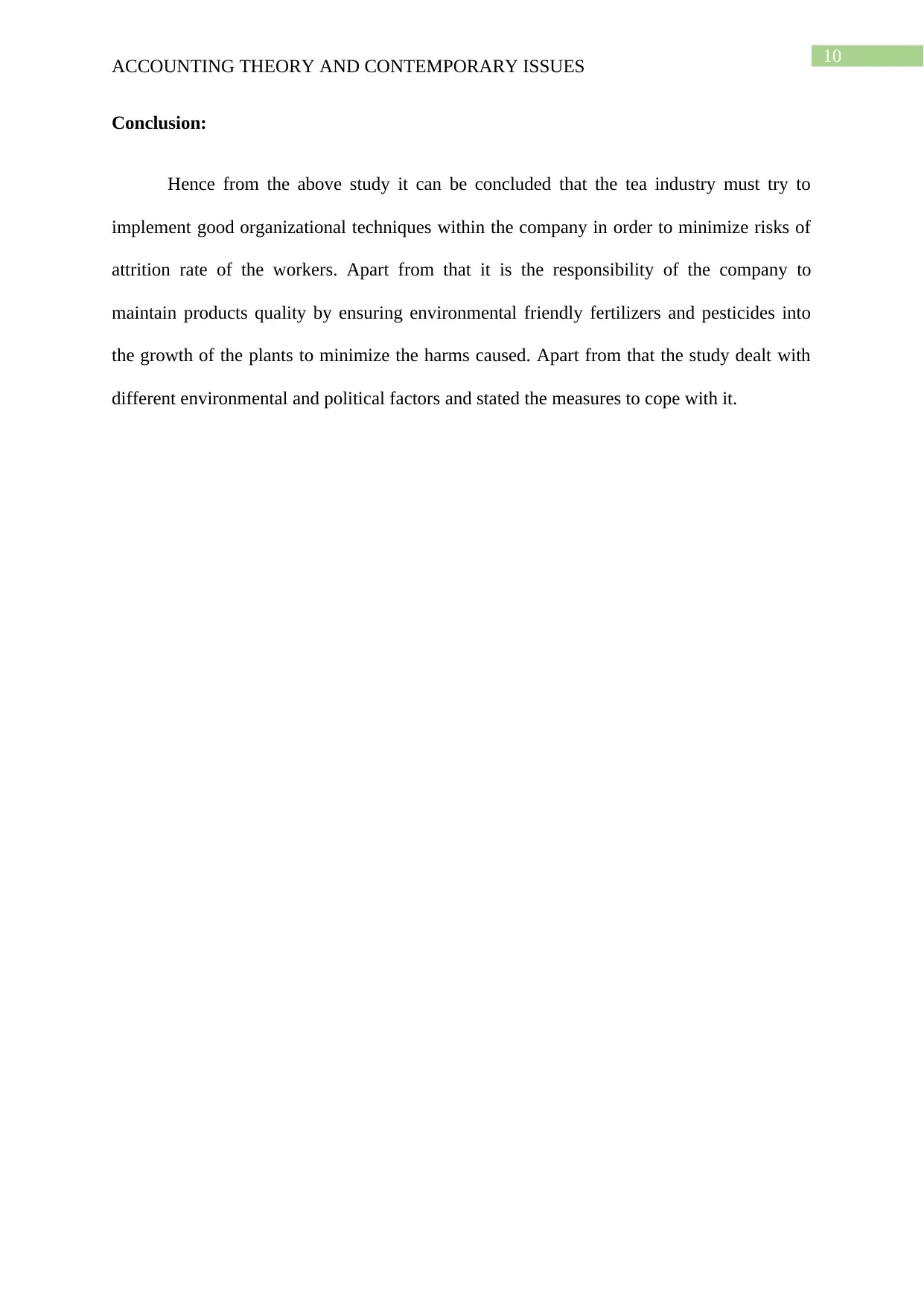
10
ACCOUNTING THEORY AND CONTEMPORARY ISSUES
Conclusion:
Hence from the above study it can be concluded that the tea industry must try to
implement good organizational techniques within the company in order to minimize risks of
attrition rate of the workers. Apart from that it is the responsibility of the company to
maintain products quality by ensuring environmental friendly fertilizers and pesticides into
the growth of the plants to minimize the harms caused. Apart from that the study dealt with
different environmental and political factors and stated the measures to cope with it.
ACCOUNTING THEORY AND CONTEMPORARY ISSUES
Conclusion:
Hence from the above study it can be concluded that the tea industry must try to
implement good organizational techniques within the company in order to minimize risks of
attrition rate of the workers. Apart from that it is the responsibility of the company to
maintain products quality by ensuring environmental friendly fertilizers and pesticides into
the growth of the plants to minimize the harms caused. Apart from that the study dealt with
different environmental and political factors and stated the measures to cope with it.
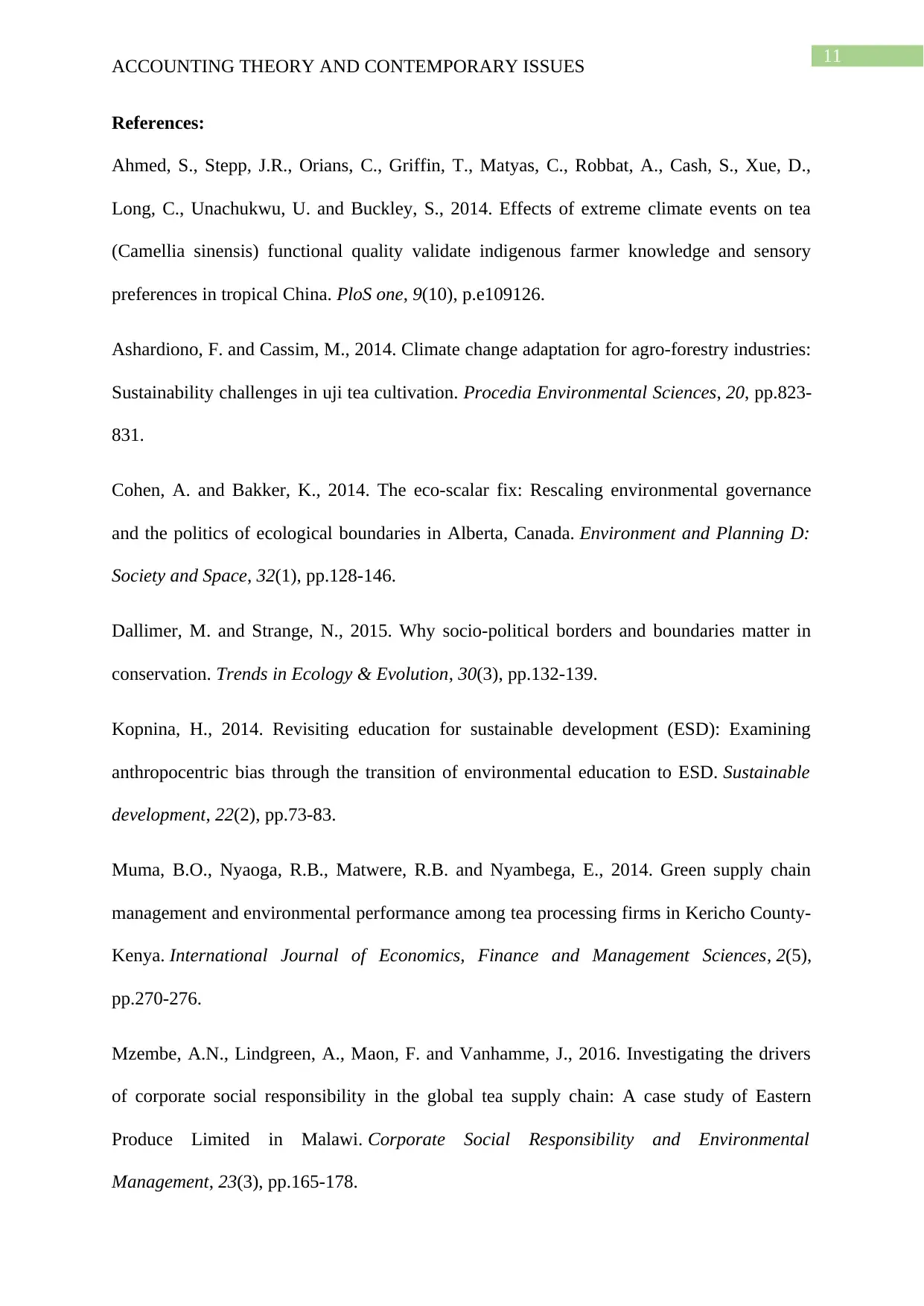
11
ACCOUNTING THEORY AND CONTEMPORARY ISSUES
References:
Ahmed, S., Stepp, J.R., Orians, C., Griffin, T., Matyas, C., Robbat, A., Cash, S., Xue, D.,
Long, C., Unachukwu, U. and Buckley, S., 2014. Effects of extreme climate events on tea
(Camellia sinensis) functional quality validate indigenous farmer knowledge and sensory
preferences in tropical China. PloS one, 9(10), p.e109126.
Ashardiono, F. and Cassim, M., 2014. Climate change adaptation for agro-forestry industries:
Sustainability challenges in uji tea cultivation. Procedia Environmental Sciences, 20, pp.823-
831.
Cohen, A. and Bakker, K., 2014. The eco-scalar fix: Rescaling environmental governance
and the politics of ecological boundaries in Alberta, Canada. Environment and Planning D:
Society and Space, 32(1), pp.128-146.
Dallimer, M. and Strange, N., 2015. Why socio-political borders and boundaries matter in
conservation. Trends in Ecology & Evolution, 30(3), pp.132-139.
Kopnina, H., 2014. Revisiting education for sustainable development (ESD): Examining
anthropocentric bias through the transition of environmental education to ESD. Sustainable
development, 22(2), pp.73-83.
Muma, B.O., Nyaoga, R.B., Matwere, R.B. and Nyambega, E., 2014. Green supply chain
management and environmental performance among tea processing firms in Kericho County-
Kenya. International Journal of Economics, Finance and Management Sciences, 2(5),
pp.270-276.
Mzembe, A.N., Lindgreen, A., Maon, F. and Vanhamme, J., 2016. Investigating the drivers
of corporate social responsibility in the global tea supply chain: A case study of Eastern
Produce Limited in Malawi. Corporate Social Responsibility and Environmental
Management, 23(3), pp.165-178.
ACCOUNTING THEORY AND CONTEMPORARY ISSUES
References:
Ahmed, S., Stepp, J.R., Orians, C., Griffin, T., Matyas, C., Robbat, A., Cash, S., Xue, D.,
Long, C., Unachukwu, U. and Buckley, S., 2014. Effects of extreme climate events on tea
(Camellia sinensis) functional quality validate indigenous farmer knowledge and sensory
preferences in tropical China. PloS one, 9(10), p.e109126.
Ashardiono, F. and Cassim, M., 2014. Climate change adaptation for agro-forestry industries:
Sustainability challenges in uji tea cultivation. Procedia Environmental Sciences, 20, pp.823-
831.
Cohen, A. and Bakker, K., 2014. The eco-scalar fix: Rescaling environmental governance
and the politics of ecological boundaries in Alberta, Canada. Environment and Planning D:
Society and Space, 32(1), pp.128-146.
Dallimer, M. and Strange, N., 2015. Why socio-political borders and boundaries matter in
conservation. Trends in Ecology & Evolution, 30(3), pp.132-139.
Kopnina, H., 2014. Revisiting education for sustainable development (ESD): Examining
anthropocentric bias through the transition of environmental education to ESD. Sustainable
development, 22(2), pp.73-83.
Muma, B.O., Nyaoga, R.B., Matwere, R.B. and Nyambega, E., 2014. Green supply chain
management and environmental performance among tea processing firms in Kericho County-
Kenya. International Journal of Economics, Finance and Management Sciences, 2(5),
pp.270-276.
Mzembe, A.N., Lindgreen, A., Maon, F. and Vanhamme, J., 2016. Investigating the drivers
of corporate social responsibility in the global tea supply chain: A case study of Eastern
Produce Limited in Malawi. Corporate Social Responsibility and Environmental
Management, 23(3), pp.165-178.
⊘ This is a preview!⊘
Do you want full access?
Subscribe today to unlock all pages.

Trusted by 1+ million students worldwide
1 out of 13
Related Documents
Your All-in-One AI-Powered Toolkit for Academic Success.
+13062052269
info@desklib.com
Available 24*7 on WhatsApp / Email
![[object Object]](/_next/static/media/star-bottom.7253800d.svg)
Unlock your academic potential
Copyright © 2020–2026 A2Z Services. All Rights Reserved. Developed and managed by ZUCOL.





